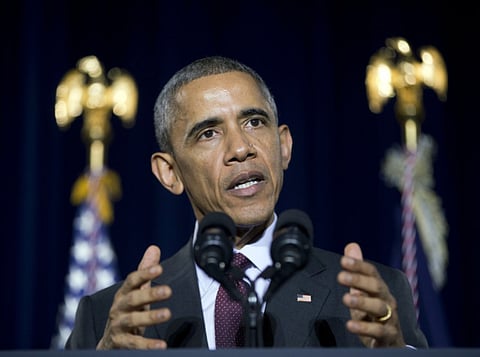Obama: The West’s lonely liberal on immigration
Obama’s approach on immigration sounds more fatalistic

What should western politicians be most worried about: Growth, inequality, environment, education? To judge from today’s discourse, the answer seems to be none of the above. Instead, in the past month, both US President Barack Obama and British Prime Minister David Cameron have made big speeches on immigration. Last week, Swiss voters rejected a proposal virtually to end the flow of incomers to their country. But anti-immigration parties have made strong gains in a variety of other European nations, including Sweden and Italy, in the past year. Immigration is now clearly at the very centre of political debate in the West. But, in the past couple of weeks, the European and US debates have branched off in different directions.
Two weeks ago, Obama announced plans to shield millions of illegal immigrants from potential deportation. For all the bitter divisions his proposals stirred up, the likelihood is that they will ultimately help to push the American debate in a more liberal direction. In Europe, by contrast, the rise of populist anti-immigration parties, such as the United Kingdom Independence Party and France’s National Front, is still driving the debate to the right.
Cameron announced plans to restrict welfare benefits for legal migrants from the rest of the European Union (EU) and to force those who fail to find a job to leave the country. Across the Channel, meanwhile, Nicolas Sarkozy, the former (and possibly future) president of France, has called for the repeal of the Schengen rules that have dismantled frontier controls within the EU.
Despite the differences in rhetoric, the immigration numbers across the rich world are strikingly similar. Estimates by the Organisation for Economic Cooperation and Development (OECD) of the foreign-born population in its member states in 2011 was 11-13 per cent for the US, the United Kingdom, Germany and France. Switzerland, with a foreign-born population of 27.3 per cent, is a real outlier — which may account for the special vehemence of the debate there.
Rich countries are clearly a magnet for migrants from poorer nations and the pull is growing stronger. According to the OECD, the flow of global migration doubled between 2000 and 2010, compared to the preceding decade.
Globalisation has made both travel and communication much easier. The comparative wealth of western Europe or North America is broadcast across the world. Established immigrant communities in developed nations can help newcomers and provide legal routes into the country. And, where there is no legal route, there are always people-smugglers and the black economy.
Immigrants often do jobs that locals are unwilling or unable to perform, but they are also routinely blamed for holding down wages and for putting pressure on public services and housing. With levels of inequality rising in the West, it is not hard for populist politicians to argue that limousine liberals are benefiting from cheap, immigrant labour — while evading the social consequences.
So far, so similar. But the US and European approaches are diverging. Obama has taken on the anti-immigration lobby, casting them as un-American and inhumane. In Britain and the rest of Europe, however, many governments are still promising to “crack down” on immigration, in some form or another — even if political leaders such as Cameron refrain from challenging the EU’s commitment to free movement of labour.
The difference partly reflects the fact that Obama is a centre-left politician and Cameron is a conservative. The US Democrats also see an electoral advantage in luring the Republicans into taking a hard line on immigration, which will alienate Hispanic voters.
In Europe, the political calculations point in the opposite direction. Cameron fears losing support to Ukip, which has made opposition to mass immigration its central theme. Other centre-right politicians in the EU, such as Sarkozy, also seem most concerned about the threat from the far right.
Behind the politics, however, there is also an emerging difference in philosophy. Cameron, Sarkozy and politicians to their right still stress the language of “control”. Their argument is that voters are unhappy about high levels of immigration and that it is their duty to respond.
Obama, though, is taking an approach that sounds more fatalistic. He says he will strengthen border controls but adds that “tracking down, rounding up and deporting millions of people isn’t realistic”.
Implicit in the Obama argument is the idea that, in the era of globalisation, rich nations are just going to have to get used to the notion that they will continue to be a magnet for migrants from poorer parts of the world. The alternative is to start turning one’s country into a fortress or a police state.
There are several reasons why the Obama argument may work in the US. As the US president pointed out, America was built by immigrants. It is also a continent-sized country that has plenty of space. And it has an established two-party system that makes it harder for single-issue, anti-immigration parties to gain ground.
But none of those conditions prevail on the other side of the Atlantic. As a result, the populist right is likely to make the running in Europe’s immigration debate for some years to come.
— Financial Times
Sign up for the Daily Briefing
Get the latest news and updates straight to your inbox



